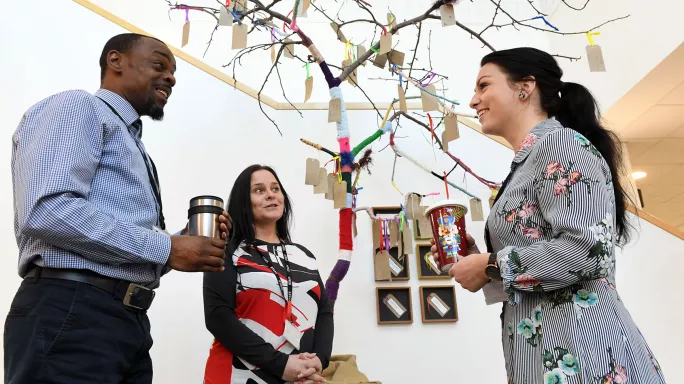- Home
- The award-winning primary that made its staff feel amazing
The award-winning primary that made its staff feel amazing

At Longwood Primary Academy, staff know they are valued wherever they go - even in the loos.
“You, yes, YOU do a truly amazing job!” announces a sign on the back of a ladies’ toilet door, beneath a Superman logo. “Remember to be good to yourself! You are a super person!”
As you walk around the school in Harlow, north-east London, the sense of wellbeing only grows. Soothing music plays in the corridors, as children file by between walls lined with students’ work mounted in glass frames.
Inside the classrooms, displays on topics from the Windrush generation to the Vikings, all in a few simple colours, give a sense of ordered calm.
One room even contains a “meditation pod” filled with a squishy reclining chair plus footstool and an MP3 player playing calming sounds, such as rainfall or waves. The school’s staff, and some of its pupils, use the pod once a week to take a break from the stresses of the day.
“We really want to push boundaries in terms of looking at staff wellbeing,” explains headteacher James Hollinsey.
“As a leadership team, we’re very much of the opinion that wellbeing very much matters, and there is the responsibility of you as an employer to make sure everyone’s OK. The more we’ve got into it, the more we’ve understood how we can do that.”
Longwood today is a far cry from the school he joined in 2015. Newly academised after being placed in special measures, back then it was rife with bad behaviour and its exclusion rate was 20 times the national average.
Results were poor and rapid turnover meant 80 per cent of the school’s classroom staff were on supply contracts.

“It was quite a negative place to be,” recalls Hollinsey, describing how the environment had bred “low self-esteem” among students and teachers.
He and his team decided to prioritise staff and student wellbeing. They began with small changes to give pupils more “pride” in the school, such as giving them lockers and tidying the classrooms. They put staff on permanent contracts and set up a coaching system to improve teaching.
By 2016-17, they had distilled their approach into three “strands”: teach, rest and play.
Fact-finding abroad
To improve teaching, the school has focused on improving its continuing professional development. Staff are encouraged to take courses to pick up new skills on topics including leadership and behaviour management, with some even venturing as far afield as Finland.
All staff get detailed, regular feedback on how they’re doing through the “teaching and learning” programme. Colleagues take turns observing each other in the classroom to pick up ideas and tips. Those who go the extra mile even get extra paid-leave “star days”.
Year 5 teacher Matthew Fordyce says the emphasis on CPD really showed when he went on a recent middle leaders’ course. “Even though it was only my fourth year of teaching, there were people there that had been teaching for 20 years and I already had a lot more [varied experience],” he notes.
Training is important because Longwood has such a young workforce - next year, about half of the teaching staff will be newly qualified teachers or direct placements. Most new hires spend their first year shadowing more experienced staff in the classroom, building up their confidence before they fly solo.

Creating a healthy work/life balance is crucial to its aims. In 2016-17, the school introduced a reduced-marking policy, which cut workload by 67 per cent.
Longwood also took the radical step of adding 30 minutes to the school day to give more teaching time, then giving it back as 13 days of extra holiday per year. Unsurprisingly, this has proved popular with staff and students alike.
Outside school, staff have built up a social programme that caters for everyone. The team put on regular events, from theatre trips to whitewater rafting or parties at each other’s houses. But Hollinsey is quick to emphasise no one is obliged to take part.
“I think that’s what schools need to understand - you can provide it, but it’s a no-pressure thing,” he says.
Longwood has also placed a strong emphasis on physical, as well as mental, wellbeing. Many of the staff take part in a running club, and the school has added a new staffroom and outside staffroom to ensure all employees get access to plenty of fresh air.
The school overhauled its ordering process so it could afford to offer both staff and students free, healthy meals, too.
(Watch the team’s five top tips to make your teachers happy here.)
‘The same songsheet’
The schemes have already had a huge impact. No staff have left since they were introduced and results have improved.
As the school’s reputation has grown, so too have applications. This year, its Reception year is full for the first time. Next year, pupil numbers are expected to top 400, compared with 250 in 2015. Last year, some 50 delegates visited Longwood to pick up tips.
“It is just that accessibility and that communication which makes it work,” says Year 6 teacher Mandy Line. “There’s a lot more structure, a lot more emphasis on our outcomes. A lot more focus on the children as individuals. A lot more individual attainment and achievement. A lot more progress.”

Jane Hart, Longwood’s longest-standing member of staff, says pupils’ behaviour has also improved dramatically. “It was bad before,” she recalls. “The children were very angry, day in, day out. There was this anger that they brought maybe from home with them and transferred into their school life.
“Now, the team is set up as it is, and we all sing from the same songsheet, they realise the respect now carries from one team member to another. Everybody works with the same attitude, with the same consequences for their actions. Everyone backs each other and the children know this.
“It’s a totally different atmosphere in the school now. My granddaughter comes here now…My children didn’t come to this school.”
Lead judge for the Tes 2018 Employer of the Year award, Keziah Featherstone, said she was impressed by how Longwood had struck a balance between an effective wellbeing programme and treating staff as individuals.
“They’ve managed to create a really nice community and that’s how you retain people,” she says.
“It was very clear that they had a focus on treating their staff as professionals…and treating them as human beings that need opportunities to develop and also to rest.”
Creating a community
Much of this invention has been bred by necessity. Longwood sits in a deprived part of Harlow and four in 10 of its students receive the pupil premium. Like many schools on the outskirts of London, it also struggled to attract staff.
“Teachers can drive 10 miles down a motorway and earn an extra £10,000 a year more, so we had to think outside the box,” explains Jo Coton, executive head of the NET Academies Trust, which includes Longwood.
“We had to ask: what can we do during the week to make people feel they’re part of a community rather than just a workplace?”

NET tackled that problem by building a community from the five schools it runs in Harlow, which are all within a few minutes of each other. Many teachers in the trust have formed friendships through “collaborative planning” days together and social events.
This has proved doubly important for new joiners who come from as far afield as Australia and Scotland.
For the headteachers, too, having colleagues nearby is also important. They regularly hold meetings in each other’s schools so that they can “magpie ideas” from each other. Where one has expertise that another lacks, they partner to share advice and ideas.
“As we’ve grown from three to five schools, you’ve got five very different headteachers, but we’ve seen that as a positive,” says Coton. “It’s about communication.”
Keep reading for just £1 per month
You've reached your limit of free articles this month. Subscribe for £1 per month for three months and get:
- Unlimited access to all Tes magazine content
- Exclusive subscriber-only stories
- Award-winning email newsletters



